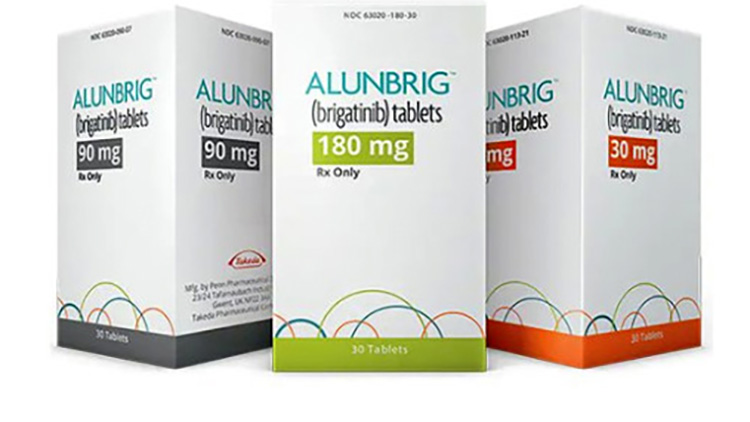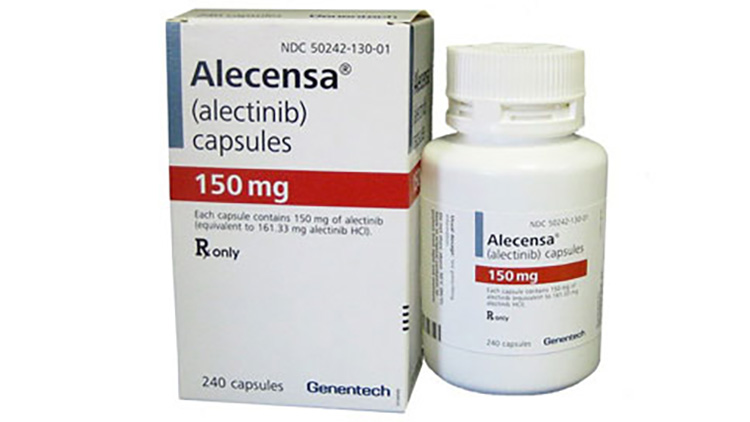Alunbrig (brigatinib) vs Alecensa (alectinib)
Alunbrig (brigatinib) vs Alecensa (alectinib)
Alunbrig (brigatinib) and Alecensa (alectinib) are both second-generation oral tyrosine kinase inhibitors approved for the treatment of ALK-positive non-small cell lung cancer (NSCLC), but they differ in their specific indications and side effect profiles. Alunbrig is typically used after crizotinib failure and has shown high efficacy in patients with central nervous system (CNS) metastases, but may present side effects such as hypertension and elevated creatine phosphokinase. Alecensa, on the other hand, is often chosen as a first-line treatment for ALK-positive NSCLC due to its effectiveness and a generally well-tolerated side effect profile, which includes the risk of liver enzyme elevation and renal impairment. Choosing the right medication depends on individual patient factors, previous treatments, and potential side effects, and should be made in consultation with a healthcare professional specialized in oncology.
Difference between Alunbrig and Alecensa
| Metric | Alunbrig (brigatinib) | Alecensa (alectinib) |
|---|---|---|
| Generic name | Brigatinib | Alectinib |
| Indications | For the treatment of patients with anaplastic lymphoma kinase-positive (ALK+) metastatic non-small cell lung cancer (NSCLC) who have progressed on or are intolerant to crizotinib | For the treatment of patients with ALK-positive metastatic NSCLC |
| Mechanism of action | ALK inhibitor | ALK inhibitor |
| Brand names | Alunbrig | Alecensa |
| Administrative route | Oral | Oral |
| Side effects | Nausea, diarrhea, fatigue, cough, headache | Constipation, fatigue, myalgia, edema, anemia |
| Contraindications | Hypersensitivity to brigatinib or any of the excipients | Hypersensitivity to alectinib or any of the excipients |
| Drug class | Tyrosine kinase inhibitor | Tyrosine kinase inhibitor |
| Manufacturer | Takeda Oncology | Genentech (Roche) |
Efficacy
Alunbrig (Brigatinib) Efficacy in Lung Cancer
Alunbrig, with the generic name brigatinib, is a medication that has shown efficacy in treating non-small cell lung cancer (NSCLC) with a specific genetic alteration, an anaplastic lymphoma kinase (ALK) mutation. The U.S. Food and Drug Administration (FDA) approved brigatinib for patients with ALK-positive metastatic NSCLC who have progressed on or are intolerant to crizotinib, which is another ALK inhibitor. Clinical trials demonstrated that brigatinib has a significant impact on progression-free survival (PFS) in patients with ALK-positive NSCLC. In the ALTA trial, brigatinib showed a high overall response rate (ORR) and was effective in controlling central nervous system (CNS) metastases, a common complication in advanced lung cancer.
Brigatinib's efficacy is particularly notable after crizotinib failure, where it has been shown to provide a meaningful clinical benefit. The drug works by inhibiting the activity of the ALK fusion protein, which can drive the growth of cancer cells. By targeting this protein, brigatinib can help to slow down or stop the progression of the cancer. It has also demonstrated activity against several ALK mutations that confer resistance to crizotinib, making it a valuable treatment option for patients who have developed resistance to first-line ALK inhibitors.
Alecensa (Alectinib) Efficacy in Lung Cancer
Alecensa, known generically as alectinib, is another ALK inhibitor that has been approved by the FDA for the treatment of ALK-positive metastatic NSCLC. It is indicated as a first-line treatment and also for patients who have progressed on crizotinib. In clinical studies, alectinib has shown a high ORR and has been particularly effective in prolonging PFS. A notable ALEX trial compared alectinib to crizotinib in the first-line setting and found that alectinib significantly reduced the risk of disease progression or death by 53% compared to crizotinib.
Alectinib has also demonstrated a strong ability to control CNS metastases, which is a critical concern for patients with advanced NSCLC. This efficacy in the CNS is due to alectinib's ability to penetrate the blood-brain barrier effectively. In addition to its efficacy in treatment-naive patients, alectinib has also shown benefit in patients who have become resistant to crizotinib, offering an important therapeutic option for this challenging clinical scenario. Overall, both Alunbrig and Alecensa have significantly advanced the treatment landscape for patients with ALK-positive NSCLC, offering hope for improved outcomes and quality of life.
Regulatory Agency Approvals
Alunbrig
-
European Medical Agency (EMA), European Union

-
Food and Drug Administration (FDA), USA

-
Pharmaceuticals and Medical Devices Agency (PMDA), Japan

Alecensa
-
European Medical Agency (EMA), European Union

-
Food and Drug Administration (FDA), USA

-
Health Canada

-
Pharmaceuticals and Medical Devices Agency (PMDA), Japan

-
Therapeutic Goods Administration (TGA), Australia

-
Medsafe (NZ)

Access Alunbrig or Alecensa today
If Alunbrig or Alecensa are not approved or available in your country (e.g. due to supply issues), you can access them via Everyone.org.
How it works

Make an enquiry
Choose the medicine you want to buy, answer a couple of questions, and upload your prescription to speed things up. We’ll get back to you within 24 hours.


Make an enquiry
Choose the medicine you want to buy, answer a couple of questions, and upload your prescription to speed things up. We’ll get back to you within 24 hours.


Breeze through the paperwork
We'll guide you through the required documents for importing unapproved medicine, ensuring you have all the necessary information.


Get a personalized quote
We’ll prepare a quote for you, including medicine costs and any shipping, administrative, or import fees that may apply.


Receive your medicine
Accept the quote and we’ll handle the rest - sourcing and safely delivering your medicine.

Some text on this page has been automatically generated. Speak to your physician before you start a new treatment or medication.
Let's talk
If you have any questions, call us or send us a message through WhatsApp or email:
Contact us




